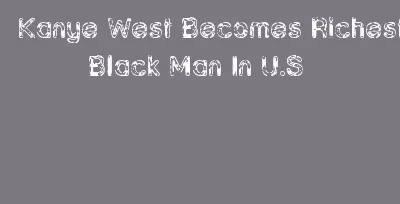OthersCommunications And EntertainmentArts And EducationRelationship And MarriageHealth And LifestyleFamily And HolidaysQuestions And AnswersNews And PoliticsSports And FitnessBusiness And MoneyFood And KitchenHobbies And HandiworksStories And PoemsReligion And PrinciplesScience And TechnologyEntertainmentVehicles And MobilityAgricultureIT And Computer ScienceUSMLE And MedicalsGive AidQuestions AnsweredEducationMoneyNewsGiveawayReligionFamilyLifetipsRelationshipsMotivationalsPersonal Care And Beauty
NM01
Others : Follow Me On Facebook:- Https://www.facebook.com/profile.php?id=100056858291530
Wants to meet Just Friends
Articles
582
Followers
22
Connect with me
profile/2375IMG_20201123_182452_877.JPG
NM01

Kanye West Becomes Richest Black Man In U.S
~1.3 mins read
Music producer, rapper, and fashion mogul Kanye West is the richest African American in the United States. Bloomberg reports that West is officially worth $6.6 billion, making him the richest Black man in America’s history. Around the same time last year, West became a certified billionaire with the help of his successful apparel and sneaker brand, Yeezy and a new multi-year contract with Gap (NYSE: GPS +1.64%). According to Business of Fashion, the Yeezy brand is valued at $3.2 to $4.7 billion. As for the new Yeezy Gap line which is set to be released later this summer, the new venture is expected to be worth more than $970 million. Since West remains the sole owner of the Yeezy company, much of his personal net worth is attributed to his recent business decisions and the $1.7 billion that he pockets from additional assets, including his significant investment into his soon-to-be ex-wife’s Skims label. An unaudited balance sheet of West’s finances has also revealed that West has $122 million in cash and stock, while his entire music catalogue is worth $110.5 million. The Yeezy brand has seen a large boom despite the economic downturn caused by the pandemic. West’s sneaker sales at Adidas (XETRA:ADS.DE -0.87%) have seen an uptick of 31 per cent from last year, bringing in $1.7 billion in annual revenue. By the end of 2021, the Yeezy designer is expected to rake in $150 million from its Gap partnership. Considering the rapper claimed to have been $53 million in debt less than half a decade ago, his feat is worth the recognition. However, it still remains a mystery as to how West’s billion-dollar company was eligible for a loan of $2 to $5 million under the Small Business Administration’s Paycheck Protection Program. |
profile/2375IMG_20201123_182452_877.JPG
NM01

After African Giant, Burna Won Grammys With Twice As Tall What Should Be The Title Of His Next Album?
~1.5 mins read
It’s so glaring how Burna Boy has been chasing the Grammy Award intentionally in the past few years before he got it this year.
In other to win the Grammy Award, he needed to change the existing narrative of African Music space and position himself as the best and biggest Afro-beat act.
To do that, Burna Boy embarked on a mission to produce “African Giant” album which housed a good number of songs themed on socio-political events in Africa.
“Äfrican Giant” album achieved its aim and got nominated for Grammys in 2020 but he lost to Angelique Kidjo who later dedicated the award to Burna Boy.
Like a brilliant student who fails a course the first time, he will pass the second time because he already has a wealth of experience from the first failure.
This was the case for Burna Boy after he lost Grammys the first time. According to him, Angelique Kidjo taught him everything he knows about Grammys and he is now “Twice As Tall“.

Burna Boy took a second shot at Grammys with an album named “Twice As Tall“. The album name positioned Burna Boy as twice bigger than any other artistes in Nigeria and Africa as a whole.
Now that Burna Boy finally won Grammys on the second attempt, his next music project will surely be a very big one right from the name he is going to give the project to some of the songs and collaborations he will have on it.
Considering the sequence of album names Burna Boy has been using, from “African Giant” to “Twice As Tall“, imagine the name he will give his next album as a Grammy winner.
Can you take a guess?
After “African Giant”, Burna Won Grammys With “Twice As Tall” – What Should Be The Title Of His Next Album?
Advertisement

Link socials
Matches
Loading...